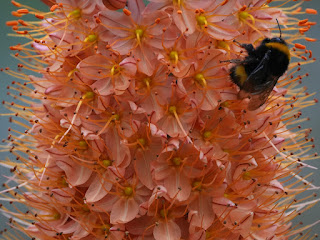Three Wren chicks appeared on a tree stump near the Italian Garden. One of them flew to a big leaf of Chilean rhubarb ...
... where it was furious when a parent visited it without bringing an insect.
A Stock Dove wandered around my feet near the Physical Energy statue. This was a surprise, as they are usually shy.
Swifts and House Martins, and probably some Sand Martins too, whizzed over the Round Pond at low altitude catching midges.
It was too windy for a sight of one of the Little Owls here, but fortunately the male at the Serpentine Gallery was in his usual place. He hates being photographed, and moved to a different branch seconds after I took this picture.
Two Carrion Crows buzzed a Grey Heron on the edge of the Serpentine. They are inveterate enemies, in spite of Aristotle's remark in book 9 of his History of Animals that they are friends.
There are now four broods of Coot chicks in the Italian Garden, one in each of the rectangular fountain pools. This is the latest, with six chicks.
Plants on the edge of the Peter Pan waterfront have been cut down, and the Coots nesting on the post have wasted no time in lining and decorating their nest with fresh leaves.
The single Red-Crested Pochard drake was at the Vista, still looking smart though most of the other ducks are going into eclipse.
The Mute Swans were on the nesting island with their cygnets, accompanied by a nesting Cooot, a female Tufted Duck and a Common Pochard drake.
The Mandarin on the Round Pond had managed to organise her wayward ducklings into a huddle on the gravel strip.
The Mallard family was on the edge of the pond, surrounded by an admiring crowd.
One of the Bar-Headed x Greylag Goose hybrids has come from St James's Park to the Serpentine to moult. It's three quarters Bar-Head and looks almost exactly like a pure bred one.
It was too cold and windy to be a good day for insects, and there was little out but hardy Buff-Tailed Bumblebees and Honeybees. They revolved ecstatically in the little flowers of a bramble, picking up all the pollen they could. They behave the same in single roses, and brambles are of the same family and have flowers like minature roses.
A Buff-Tail worked over the pink clover in the grass near Physical Energy.
One in the Rose Garden was trying to get into a tight double rose. It must have succeeded at least sometimes, as it visited several flowers on the bush.
Another was having an easier time on a foxtail lily.
On the stem below the flower, a Wren looked suspiciously at the camera.













We're not kidding when we call Wrens tiny balls of fury. Dear God, what a temper.
ReplyDeleteAristotle got a couple of things really wrong (I like to think that he didn't write that part of Book IX), because he was dependent on his informers. The other thing he got spectacularly wrong was the famous swan song. He insisted swans sung before dying. Alexander of Myndos, who was the best ornithologist in antiquity, once said, quite drily, that he had seen many swans die and not one had sung.
Tinúviel
*swans sang, not sung.
DeleteThere are lots of Wrens all the way down the sides of the Long Water, and whenever a Magpie or Jay spproaches the air is rent with furious nattering..
DeleteThe idea of the swansong is inextinguishable now, as the word has entered ordinary language. It seems dreadfully unfair that the Black Swan utters melodious hoots while the Mutes can only summon up grunts and hisses.
I think Americans use 'sung' for the past tense.